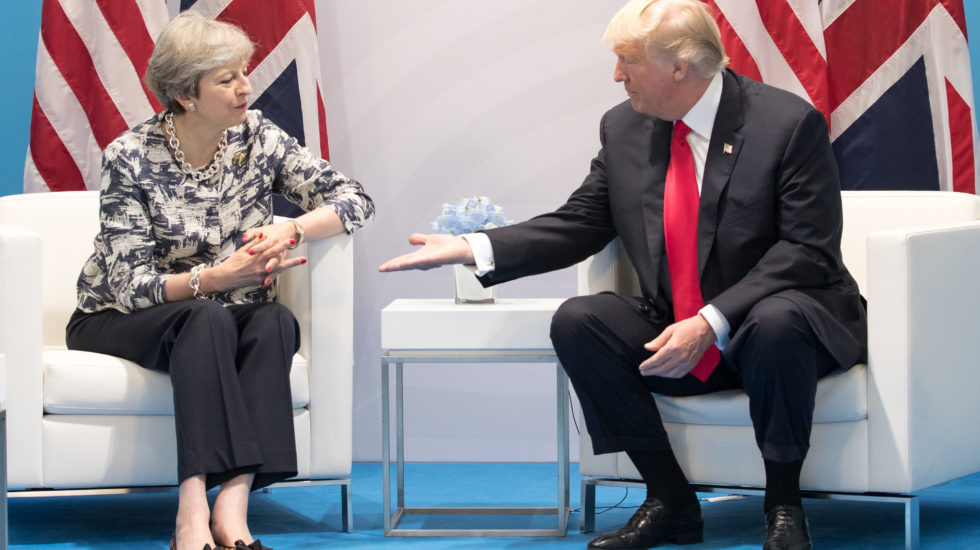Both leaders rode into office on a wave of populist anger. Both espouse hard-line policy positions once anathema to their respective political parties. Both are hellbent on bulldozing traditional alliances and forging some sort of new world order that prioritizes their nation’s sovereignty over collective action. And both have survived scathing press attention and shown tenacity in defending themselves even when entrenched media and political elites have written them off as bumblers or fools.
But if President Donald Trump and U.K. Prime Minister Theresa May have a fair amount in common, that has not translated into a geopolitical alliance, shared sense of purpose, or even a passable personal relationship. From Washington to London, “the alliance first coined by Winston Churchill and famously nurtured by Ronald Reagan and Margaret Thatcher in the 1980s has become increasingly dysfunctional and at its least cordial in decades,” Bloomberg reports.
Publicly, Trump’s impulsiveness has wreaked havoc on the relationship: May was reportedly appalled when the White House leaked intelligence in the tender hours after the ISIS-inspired bombing in Manchester at an Ariana Grande concert. Trump has subsequently criticized London’s Muslim mayor, Sadiq Khan, for his handling of other terrorist incidents. And Trump created a firestorm when he retweeted a blatantly racist, anti-Muslim message posted by a British extremist.
And then there’s what we’ll call the Poodle problem, in honor of Theresa May’s predecessor, Tony Blair, who saw his political reputation forever tarnished when he got too close to former President George W. Bush over the Iraq War. Blair’s embrace of the Bush doctrine was at odds with British public opinion, shredding his standing at home. The British tabloids had a field day calling Blair “Bush’s poodle.” Fearing a repeat, May has tried to draw a sharp contrast between her government’s position on issues such as the Paris climate accord and the Iran nuclear deal. At the same time, she’s stuck in a Catch-22 of her own making: As London attempts, through Brexit, to pull away from Europe, it had planned to strengthen its ties to the U.S. But that means May needs to cultivate Trump, even as she tries to keep her distance.
According to Bloomberg, May’s staff was wary of her first visit to Washington to meet with Trump and were concerned about the optics when May was photographed holding Trump’s hand. Behind the scenes, the meetings went well enough but the follow-up has proven to be a “nightmare” in one source’s words, according to Bloomberg. That’s because May hastily offered Trump a state visit to London, to stay with the Queen at Buckingham Palace. The outcry in Britain and the promise of dramatic street protests caused both sides to put the trip on hold. Trump asked May to ensure “a warm welcome,” a promise she was in no position to make. Appearing wounded, Trump finally tweeted a bitchy comment about the new U.S. embassy, as a rationale for canceling.
Reason I canceled my trip to London is that I am not a big fan of the Obama Administration having sold perhaps the best located and finest embassy in London for “peanuts,” only to build a new one in an off location for 1.2 billion dollars. Bad deal. Wanted me to cut ribbon-NO!
— Donald J. Trump (@realDonaldTrump) January 12, 2018
If May’s ambition was to cultivate Trump by appealing to his love of gold thrones and sense of grandiosity, she failed. And her position at home is no stronger– and likely weaker–for having made the offer in the first place.
To be sure, the United States and Great Britain are bound together in a million ways, from close military ties to shared legal philosophies and an intertwined history. This week, the two leaders will meet at the World Economic Forum in Davos and likely do their best to downplay their differences. But though the “Special Relationship” is likely to survive the Trump-May Era, it is also unlikely to grow stronger as a result of it.
Ultimately, for all that they share in common, Trump and May may struggle to relate to one another for one simple reason: He is not intellectually or emotionally prepared to work cooperatively with anyone, let alone an independent-minded woman who perceives herself to be his equal, and perhaps even more than that. In all of Bloomberg’s reporting, one detail is particularly telling: May hates talking to Trump by phone, according to insiders, because he always interrupts her after 10 seconds.
And, apparently, half of the time he simply wants to brag about his British golf courses.
